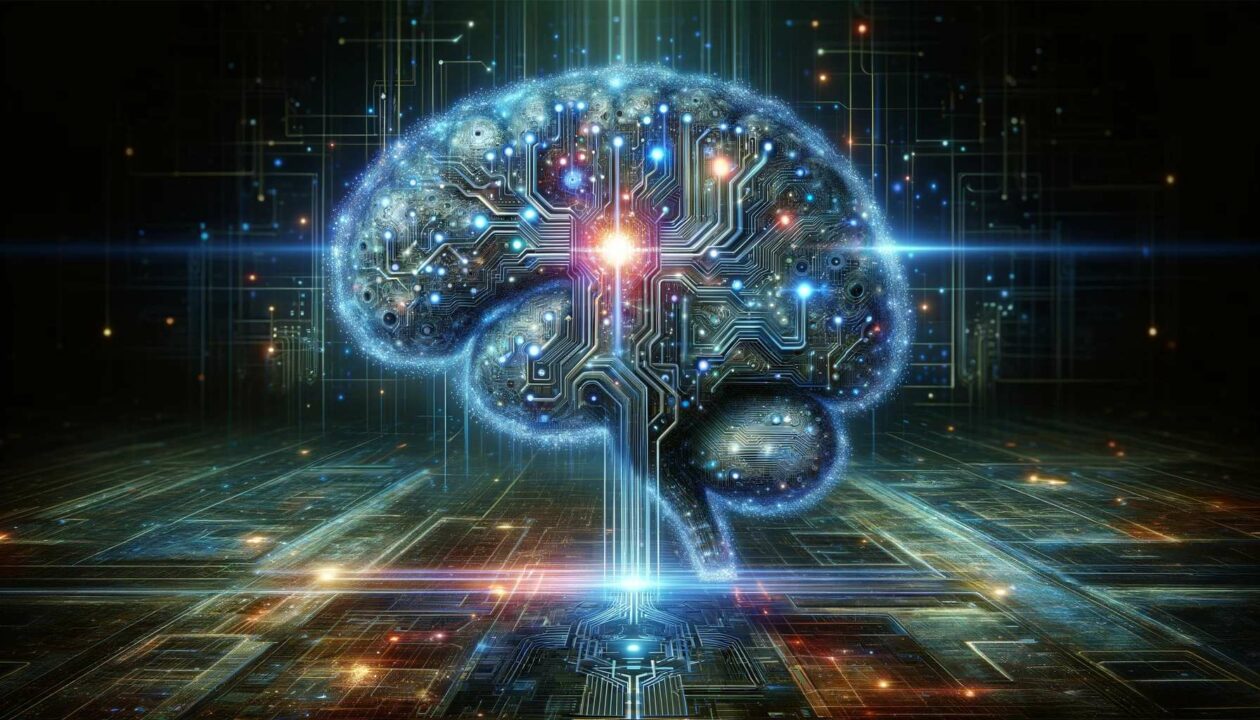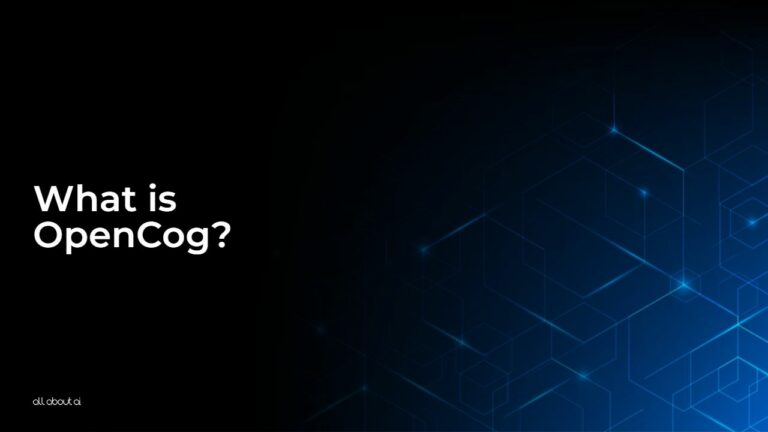What is OpenCog? OpenCog represents a significant stride in the realm of artificial intelligence. Distinguished by its ambitious goal, it seeks to create a general intelligence framework, designed to equip machines with learning, reasoning, and understanding capabilities akin to human cognitive abilities.

Looking for more information on OpenCog? Read this article written by the AI masters at All About AI.
Main Goals of OpenCog
The primary objectives of OpenCog are multifaceted. At its core, it aims to develop software that surpasses existing AI systems in learning and reasoning efficiency. This involves an integrative approach, combining various methods from machine learning, natural language processing, and cognitive science to forge a more versatile and adaptive artificial intelligence.
Developing Advanced General Intelligence
One of the paramount goals of OpenCog is to pioneer the development of advanced general intelligence. This ambition stretches beyond the capabilities of conventional AI, aiming to create a system that not only excels in specific tasks but also demonstrates a broader understanding and cognitive abilities akin to human intelligence.
Integrative AI Techniques
Another key objective is to synergize disparate AI methodologies. OpenCog seeks to blend various approaches, such as machine learning, natural language processing, and cognitive science, to form a more holistic and effective AI framework. This integration is pivotal in transcending the limitations of single-method AI systems.
Open-Source AI Development
OpenCog is committed to fostering an open-source development environment. This goal involves building a collaborative and transparent platform where developers worldwide can contribute, innovate, and share their expertise in AI, thereby democratizing AI development and innovation.
How Does OpenCog Differ From Other AI Projects?
What sets OpenCog apart is its holistic methodology. While other AI projects often concentrate on specific domains like deep learning, OpenCog synergizes these technologies within a unified cognitive framework. This integration fosters more complex and nuanced AI behaviors, marking a significant departure from traditional AI models.
What OpenCog Achieved So Far?
To date, OpenCog has made impressive progress, demonstrating the viability of its integrative AI approach. The project’s developments have advanced our understanding of how different AI methodologies can be synergized to construct sophisticated, adaptive AI systems.

Pioneering Integrative AI Frameworks
A notable achievement of OpenCog is its success in creating one of the first integrative AI frameworks. This framework demonstrates the practicality and effectiveness of combining various AI methods into a cohesive system, marking a significant step forward in the field.
Advancing Cognitive Algorithms
OpenCog has contributed to the advancement of cognitive algorithms, particularly in areas like natural language understanding and reasoning. These advancements have enhanced the capability of AI systems to process and understand complex information more effectively.
Community and Ecosystem Development
Another achievement lies in the establishment of a robust community and ecosystem around OpenCog. This has encouraged widespread participation and collaboration, leading to accelerated development and innovation within the project.
How Can Individuals Get Involved With OpenCog?
OpenCog’s open-source nature offers a platform for developers to contribute to its evolving codebase. Beyond coding, AI enthusiasts and researchers can engage through community forums and discussions, sharing ideas and insights.
Why Is OpenCog Significant in Today’s AI Landscape?
In the fast-paced world of AI, OpenCog represents an essential paradigm shift. Its focus on the amalgamation of diverse AI techniques positions it as a pivotal project in the journey toward more general and adaptable AI systems.

Promoting AI Integration
OpenCog’s emphasis on integrating diverse AI technologies sets a precedent in the field. This approach is significant as it paves the way for more comprehensive and capable AI systems, demonstrating the potential of combined methodologies in advancing AI capabilities.
Fostering Open-Source Collaboration
OpenCog’s open-source model is vital in promoting transparency and collaboration in AI development. This approach democratizes AI research and development, allowing for a more inclusive and diverse contribution from the global community.
Advancing General AI Research
OpenCog’s focus on general intelligence is crucial in shifting the AI narrative from task-specific applications to more versatile and adaptive systems. This aligns with the broader goals of AI research, aiming to create systems that more closely resemble human cognitive abilities.
OpenCog’s Future: What’s Next?
Looking ahead, OpenCog is set to continuously evolve, integrating cutting-edge AI advancements to refine and scale its framework. This ongoing development is crucial for achieving more complex levels of artificial intelligence.
Enhanced Scalability and Robustness
A future trend for OpenCog is the continued emphasis on scalability and robustness. As AI applications grow in complexity, OpenCog aims to evolve accordingly, ensuring that its framework can handle increasingly sophisticated tasks.
Integration of Cutting-Edge Technologies
Another trend is the integration of emerging technologies, such as quantum computing and advanced neural networks. OpenCog is poised to incorporate these advancements to further enhance its capabilities and efficiency.
Expansion into Diverse Domains
OpenCog is expected to expand into various domains, from healthcare to finance, offering more versatile and industry-specific solutions. This trend will showcase the practical applicability of its integrative AI approach in real-world scenarios.
Fostering a Global AI Community
Lastly, OpenCog will likely continue to grow its global community. This expansion will not only involve developers but also educators, policymakers, and industry leaders, fostering a more interconnected and collaborative AI ecosystem.
Want to Read More? Explore These AI Glossaries!
Penetrate the universe of artificial intelligence with our organized glossaries. Designed for every learner, there’s always more to explore and understand!
- What is Computational Mathematics?: It’s a branch of mathematics that uses algorithms, computer simulations, and numerical analysis to solve mathematical problems.
- What is Computational Neuroscience?: Computational neuroscience is an interdisciplinary scientific field that employs mathematical models, theoretical analysis, and computer simulations to understand the structure, dynamics, and functioning of the nervous system and the brain, particularly in relation to cognitive and behavioral functions.
- What is Computational Number Theory?: It is a branch of mathematics that deals with algorithms for performing calculations within number theory.
- What is Computational Problem?: In the context of artificial intelligence, a computational problem is a task or a question that can be addressed and solved using computational methods.
- What is Computer Automated Design?: Often referred to as CAD, Computer Automated Design (CAD) is a digital technology that enables engineers, architects, and designers to create, modify, and optimize detailed 2D and 3D models of objects and structures with precision and efficiency.
FAQs
What is OpenCog Hyperon?
How does OpenCog work?
How can I use AI?
Which is the best AI tool?
Is AI good for beginners?
Conclusion
OpenCog is more than just an AI project; it’s a beacon in the quest for artificial general intelligence. Its integrative approach and community-driven development encapsulate the spirit of innovation in AI, inviting continued participation and advancement from the global tech community.
This article neatly answered the question, “what is OpenCog.” To learn more about other AI concepts and key terms, read through the articles we have in our AI Language Guide. There’s a wealth of information for you to uncover.





